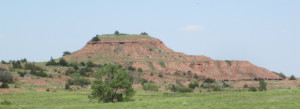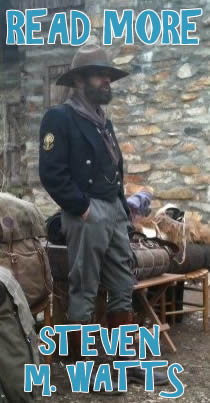This is the first hand account of a group of survivors captured by Indians before the West was open and safe. The journal as well as other documents were compiled by Nellie Snyder Yost and were published as the book titled ‘Medicine Lodge: The story of a Kansas frontier town.’ The ISBN is 0-8040-0199-5. I’ve found a few copies for sale, both new and used, over at Amazon. Probably not a biggie since the locals would be the only ones interested in buying it. Anyways, enjoy.
Legend of Flower Pot Mountain
Late in January, 1871, there came a white buffalo hunter to the junction of Elm Creek with the Medicine Lodge River in southern Kansas. Orange Scott Cummins, the Ohio born “Pilgrim Bard,” was deeply impressed by the country he saw there, by the wild beauty of its deep canyons and its red hills carved by erosion into towering mesas and buttes.
Long, long ago a tribe of Indians known as the Kiowa had chosen that part of North America for their own. Probably one of the most scenic and beautiful regions in Kansas, it was all that an Indian could want, for no other part of the state is so plentifully supplied with swift running streams, with sweet native grasses, or with such abundant natural shelter in the form of timber, hills, bluffs, and canyons. The beautiful river that flowed from the northwest to the southeast supplied many miles of living water. Numerous creeks emptied into the river, and the banks of all were bordered by thick stands of red cedar, elm, cottonwood, hackberry, and walnut trees. Vast herds of buffalo, elk, deer, and antelope grazed in the valleys, and bear, turkey, and other animals and fowl inhabited the timber.
In addition to all this, the Kiowas had discovered that the waters of the river were endowed with healing properties; and so they came yearly to the river, to a lovely spot in the angle made by the confluence of the river and a creek. Here they pitched their tepees, bathed in the river, and drank of its laxative mineral waters. In timer they also discovered the healing properties of many of the herbs and plants that grew on the banks of the streams. The better to use them, they built a great “medicine lodge” on the bank of the river, setting slender logs on end in a circle, bending the tops to the center, and covering the whole with rushes and earth. There in the tight lodge they heated big rocks and placed their healing herbs on them; then they poured on the water, thus filling the enclosure with clouds of aromatic steam. Bathed in the steam, the red people sweated and soaked away their ills. And who is to say those early sauna baths were no less effective than those of our day?
And so the years passed. The main stream came to be known as the Medicine Lodge River; the creek which joined it, due to the great grove of elms that lined its banks, was called Elm. Other streams draining the hills of the region bore such descriptive names as Bear, Cedar, Antelope, Spring, Turkey, Cottonwood, Elk, Hackberry, Bitter, and Big and Little Mule Creeks.
Whether or not a sacred medicine lodge stood on the banks of the river when Coronado and his host passed that way in 1541 is not known. By 1806, when Zebulon Pike led his expedition west to determine the boundaries of the Louisiana Purchase, it may have been there. Other white men later visited that good land in the Medicine Lodge River valley and some of them dealt unkindly with the Indians, turning their early friendliness to hate and fury, so that, by 1849, no pale skin was safe in the land of the Kiowa. Or so the legend goes.
The Pilgrim Bard listened to strange tales, told and retold around wilderness campfires, and, in time, recorded some of them, including the tragic “Legend of Flower Pot Mountain.” And even today, when one stands on the Barber County prairies and gazes across the miles toward the strange flat-topped butte, the Flower Pot Mountain, it is easy to believe that the story happened, and that it could have happened here.
One morning, wrote the Bard, I left camp, afoot and alone, unarmed ecept fro a Spencer rifle and two Colt 44’s. I struck out in a westerly direction, through canyons so covered with trees as almost to exclude the light of the noonday sun. I wandered along until I came in full sight of a table-top mountain which so impressed me that I resolved to visit it and explore its lofty summit.
The mountain was so much farther away than it looked that it was well into the afternoon by the time I reached it and climbed its rugged side. When at last I came to the top and pushed through the dense thicket of trees that rimmed the mountain, I was surprised to see a huge buffalo grazing peacefully on the rich buffalo grass that covered the little plateau. I couln’t resist killing a buffalo in such a romantic place, so, though I could not use so much meat, I laid him low with one shot from my Spencer.
Since it was too late to return to camp that day, I decided to skin the huge animal, cook some of his flesh for supper, and spend the night on the mountain. I roasted choice bits of the meat over a bright fire of cedar faggots, then spread the great hide beside the coals and lay down upon it. Lighting my pipe, I rested for a time, delighting in my strange situation. I had never believed in ghosts or that departed souls ever returned to earth again, so I felt no fear in this dark and lonely spot. After awhile, wrapping my shaggy fur mantle about me, I fell asleep.
It must have been near midnight when I was suddenly awakened by the most unearthly cries. The entire summit of the mountain was radiant with a weird light like a continuous glare of lightning. All was ghastly to look upon, and near the center of the plateau I saw a scene that froze the blood in my veins. About a score of hideously painted savages were dancing wildly around a blazing fire, and in the midst of the flames two human beings, bound to a stake, were roasting alive. Even above the howling of the Indians I could hear the despairing crises of the doomed victims.
It was too awful to look upon and I closed my eyes. Then stillness came over the mountain again and I lay in the darkness, wondering if it had been only a feverish dream. But suddenly a hollow voice spoke at my side. “Stranger,” it said, “you are the first of my race to put foot on this mountain since my husband and I were burned alive at the stake. Rest here until the sun rises, then repair to the eastern edge of the mountain. There you will find a cedar tree with a dead limb pointing northward. Beneath it you will find a large, flat stone. Lift it, and be governed by circumstances. What you have seen and heard tonight actually took place here, many years ago. Farewell. I shall never again speak to you.”
All was quiet again and I waited for the morning. Dawn came at last and I went at once in search of the tree with the dead limb pointing northward. It was there, just as the spirit voice had described it, but at first I could not find the stone. When I finally scratched into the earth at the base of the tree, I found it, covered with the dust and needles of the years. In all my life I had never felt such a strange sensation as the one that came over me as I stood under that ancient cedar, looking down on the stone and wondering what mystery it covered.
When I lifted it I found a small tin box neatly fitted into an earthen hole. I removed the box and slowly opened the lid. A faint musty smell arose from it. I first took from the box an ear of Indian corn and then a handful of wheat, all as fresh as when plucked from their stalks; a marriage certificate and a roll of papers, yellow with age. The certificate showed that on November 12, A.D. 1832, Evan Day and Lenora Blackwood were joined in the holy bonds of matrimony at New Orleans by the Reverend David Green. A note, attached to the roll of papers read: “To anyone who may discover these treasures. I have been told that only one more sun shall rise before my husband and myself, the last survivors of our ill-fated colony, must perish in the flames on this mountain. You will find enclosed a full and true account of events from the time we left St. Louis up to now. I cannot but believe that these valleys will some day be peopled by my race. Therefore, in the face of the dread angel of death, I ask that whoever shall find this manuscript will publish it and let the world know what happened here. Farewell forever. Lenora Day.”
LENORA DAY’S JOURNAL
St. Louis, Mo. March 13, 1849.
We are all ready to start to California, the fabled land of gold. Our company consists of 16 men, 7 women, and 9 children – 32 souls in all. We have 13 wagons, made especially for the overland route, each drawn by 3 yoke of oxen and driven by experienced men called “whackers.” The most prominent man in our train in the old Mountain Trapper, who has agreed to guide us as far as the mountains. There, he says, we can get a friendly Indian for the rest of the journey. He is a queer looking specimen of humanity, about 45 years of age, a little under 6 feet tall. His long hatchet face is covered with a grizzly bear and his iron-grey hair hangs far below his shoulders. His is minus his right ear and his left one is slit in several places. He is clothed in buckskin from head to foot and a tail-like fringe hangs from his cap to below his waist. His pantaloons, or leggings as he calls them, are fringed on the outside with human hair, black as a raven’s wing. He carries a long rifle, a pair of pistols, and a long knife. He goes by the name of “Old Drab” and rides a lean, wiry grey pony. We are to travel on steam boats to Independence, and from there take the Santa Fe trail, as it is far enough south to afford good grass for our animals, our guide says.
Independence, Mo. March 15.
We reached the town at 9 o’clock this morning, disembarked and moved out on the trail. At 4 p.m. We camped on a beautiful stream of clear water, the banks of which are heavily timbered.
March 30.
Since my last entry in my diary the weather has been so rough that we have made little progress on our journey. We are camped near a village of Pottawatomie Indians and they are holding some kind of a gathering. Old Drab says one of them has died and they are fixing to plant him. These are the first Indians I have seen and I am not favourably impressed with them. They have low brows and coarse black hair in two braids down their backs. They are all dressed alike. Each pant leg is a separate garment, tied with a string around the waist. A piece of cloth hangs down from the waist and a blanket finishes the costume. They have been singing and dancing around the lodge of the dead one, but now they cease and four of them go in and come out, carrying the copper colored corpse in a kind of chair, sitting up, his features rigid and his eyes open and staring. A blanket is thrown over his head, so his spirit will not see the direction it is borne. As soon as the pall-bearers are out of sight, half a dozen squaws tear the lodge down. The trapper tells us this is so the spirit cannot come home but will keep on to the “Happy Hunting Ground.”
The grave is a shallow hole on a knoll where others of the tribe have been buried. They put the body in the hole, still sitting up, and all his earthly effects are thrown in after him. He is covered with another blanket, then with earth, and then his pony is led up to the grave. As its front feet touch the grave its throat is cut from ear to ear and it sings with a groan onto the fresh earth. The trapper says this is so the brave will have a pony to ride to the happy hunting ground. The dead brave’s squaws then bring food, supposed to be enough for the spirit’s journey, and put it on the grave, after which each Indian returned to the camp from a different direction.
Back at our own fire, the old trapper tells us about the Indians’ happy hunting ground, a place where game of all kinds abounds, where the grass is forever green, the leaves never fall from the trees, and springs of pure, clear water flow forever. We then asked Old Drab to tell us how he came to lose his right ear and to get his left one so badly cut up.
This is the story he told us: “’Twas nigh about 8 years ago and I waar trappin’ in the Wind River Mountains. I had made a pretty good haul and waar only waitin’ fer it to git warm enough to git on the trail. I waar in the Flat Head and Shoshone country, camped in a hole in the mountain, pretty well up toward the top. I had to keep a sharp lookout, for the rascals knowed I was around and wanted to wipe me out and git my furs. One night they waar a campin’ on a sort of a bench about a quarter mile below me. The side o’ the mountain waar mighty steep, but seein’ their light I crawled out ans was sorta listenin’ to ’em. I was holdin’ onto a weesach bush, and when the bush come loose; in spite of all I could do, I slid down and down until I landed plumb in the middle of the red varmints.
We was all surprised. To jump the game waar out o’ the question, so I sorta made myself at home. They surrounded me and began askin’ questions, or so I took it, as to whaar I come from. I pointed to the moon, high and white in the sky, but I guess they didn’t believe me, fer they tied my hands behind me and began torturin’ me. First they took a red-hot iron and run it through my right ear, but I never as much as batted my eyes. This seemed to make ’em mad, so a big son-o’-a-gun walked up and drew the edge o’ his scalpin’ knife across my cheek, whaar ye see these here scars, and then he cut my left hearer off close t’ my head. But I never so much as grunted. Then he went to carvin’ on my remainin’ lug, and then stopped as a new idee struck ’em.
I could see by his motions he waar orderin’ a fire, an’ I knowed I waar to be roasted alive. So whatever I done must be done immedgitly, so I gathered my strength and made a leap, I knew not whaar. For ‘twaar all the same price whether I broke my neck or got roasted. Down I went, slidin’, till finally I fell full length in a little crick, the water had loosed up the thong that tied my hands and I waar agin a free community. My head waar a solid clot o’ blood but I made my way around the base o’ and soon crep up into my own manshun, whaar I greased my wounds with taller and went to sleep.”
So ended the trapper’s story, and one look at him would convince one of its truth.
April 28.
Since the last entry in my diary we have been progressing slowly. The weather has faired up and the grass is quite green, game is abundant and we are having a splendid time. We have passed through several villages, but all the red people seem friendly. Tonight we are camped on the big Arkansas River, near the point where the great bend throws the stream the farthest to the north. Though at low water now, it is from one-quarter to three-quarters of a mile wide and, but for quicksand, is everywhere fordable. Unlike most of the streams we have crossed, its banks are entirely destitute of timber, and for fuel we bust burn what is called buffalo chips. The old trapper tells us the river is rising a little, and that we must cross it in the morning; for the snow in the mountains is melting now and it could get very high. He says he has seen the entire valley submerged. He has already crossed several times, looking out the best way to take the wagons over.
April 29.
The sun rose clear this morning, but was soon obscured by a dark, ominous looking cloud which Old Drab, being superstitious, considers a bad omen. The river had risen nearly two feet during the night, but he says we must cross, or else lay up no telling how long. So he has the cattle pushed into the stream and driven over and back twice, to settle the bottom. Then they are yoked, 12 yoke to a wagon, and so on until all but one wagon is safely across. This one was about mid-stream when it suddenly sank out of sight. The old trapper, who had crossed every trip, was riding alongside the wagon and in some mysterious manner was caught and taken down beneath the water and sand, never to rise again.
With no small amount of labor the cattle were unhitched and driven out. By then it was dark, so our weary and despondent little band encamped on a knoll on the second bottom. The river is still rising and we wish ourselves back on the other side, with our trusty guide alive.
We were still sitting around our campfire, studying over the events of the tragic day, when we were startled by the sudden appearance in our midst of a strange looking man. We did not see him until he stood among us, with uplifted hands and eyes, invoking the “Keeper of Hosts” to rest his blessings upon our little band. His weird, un-earthly appearance, his hollow sepulchral voice, together with the earnest manner in which he spoke, caused us to wonder what manner of man he was. He wore a long black robe with a heavy binding of bright red and a large red Roman cross on the back. Hus head was uncovered and his long hair and beard were white with the frost of many winters. After his benediction he shook hands with us all, and then said, “Pale faced brothers and sisters, I was warned in a dream, three nights since, of your perilous situation and have made my way hither in order to help you if it is in my power, to pass in safety from this tangled net into which you have fallen. The red savages know you are in their country, and have known it for several days. Your guide was a traitor of the basest kind and you have been on the wrong trail ever since you started your journey. It was his intention to deliver you into the hands of the Indians, as he has done many others. But the Lord has dealt with him as he richly deserves and his black soul has gone to its reward. Brothers, it would take too long to tell you my story, and moreover I must not be seen in your camp at any time, unless at the last moment.”
“I am the mighty medicine man of three tribes, known among them as ‘White Spirit of the Whirlwind,’ and I come to save you from torture. But I must be careful, else I, too, shall die a horrible death. Every full moon I go up on the summit of the Flower Mountain to learn the wishes of the Great Spirit for his people. The mountain is sacred and not one of them dares ascend it except at my bidding. Even now I am supposed to be on the mountain in a trance. Brothers, you cannot go back because of the river, so you must follow my directions and, with the help of the Lord, I will strive to bring you through the perils that surround you. If the Indians discover you, never appear uneasy, for they will not attack as long as they think you are going farther into their toils.”
“And now take heed. I will leave you as I came, yet I will always be nearer than you may think. In five days travel you will come to the Great Medicine Village of three tribes. To guide you I will lay, at intervals along the way, cedar boughs. The tops will be pointing in the direction you must go. And every night I will put a light like this (here he drew a phial from his pouch and poured a few drops of fluid on a stick which, on being lighted, sent forth a bright red blaze) on the highest point near your camp. If you have gone to the right or left, the light will always appear on the side you must bear to. And now, farewell.” In a moment he had vanished into the night.
Before we sought our couches we agreed, with heavy hearts, that on the morrow we could do no better than to follow the directions given us by the stranger.
May 7.
After a toilsome journey over a waste of prairie, we are at last encamped on the west side of a river much smaller than the Arkansas. There are beautiful groves along its banks and all the ravines are lined with trees in the glory of full leaf, elm, cottonwood, and now and then a cedar. It is called by the Indians “River of Lodges,” also “White Medicine River.” The surrounding country is rough, almost mountainous, and the streams are swift and clear. The soil looks like the dust of our burned brick at home, and to me it seems to be the fabled land of enchantment, where we might well expect to find the fountain of youth. In all my life I have never beheld a lovelier picture than the one presented to our desert-worn eyes this May evening. High, rugged hills to the west are like castles of the feudal ages, and as I look over the bonny landscape I am led to wonder for what purpose God created this lovely land.
After leaving our camp on the Arkansas, we followed the directions given us by our mysterious friend, the cedar boughs and the promised light reminding us of the children of Israel. Occasionally we saw bands of Indians but they never came near us, leading us to believe that, in truth, they would not attack us as long as we were going farther into their toils. Game has been plentiful and we have had as many as five kinds of flesh at one meal.
We have a bright campfire tonight, for it is quite chilly; and dark, sullen clouds are rising in the north. Muttering thunder and bright streaks of lightning warn of an approaching storm, so we take to our wagons.
May 9.
The rain fell in torrents and the night was so dreadful I could not sleep. It must have been near morning when we were startled by a voice, the voice of the mysterious White Spirit of the Whirlwind. The rain still fell as if all the windows of heaven had been thrown open, but above it we hear the Voice crying, “Fly for your lives! A terrible flood is upon you.”
The warning came none too soon, for the roaring waters were almost instantly upon us. Except for lurid flashes of lightning, all was darkness and my husband and I clung together. Then, swept out into the roaring blackness, we caught hold of the branches of an elm tree and lifted ourselves above the water. But no matter how high we climbed the water followed us and when we could go no higher the angry torrent still rose about us. Dawn came at last, lighting the place where we clung to the treetop, in water up to our waists. But the rain was abating and the water had ceased to rise. As far as we could see in any direction there was only water, a vast ocean of water, but finally we saw some of our companions, like ourselves, clinging to tree tops. Nothing of our train was in sight. Cattle, wagons, everything was gone.
Late in the afternoon we were able to come down, and we were not surprised to find that, in the lovely grove where we had camped the night before, the water had been 15 feet deep. Soon all the survivors of our train came wearily together on a high rise of ground and we counted our losses. All of the 9 children had perished, and 3 of the women and 4 men.
Dark clouds still hung on the horizon and we presented a sorry spectacle that gloomy day. But it seemed that one woe is not passed until, behold, another cometh, for even as we huddled there a band of hideously painted Indians came yelling and screeching upon us. To resist was useless and to attempt to fly was madness, so we were seized and dragged off in a westerly direction for about 6 miles, where we were taken in an Indian village of about 75 lodges. We were hurried to a large white lodge made of bleached skins, and there, to our joy, we found our mysterious friend, White Spirit of the Whirlwind.
He stood in the door of the lodge but gave us no sign of recognition. For a long time he stood looking toward the heavens. Then, his gaze still fixed on things above, he spoke to us softly in our own tongue. “Brothers, the Indians are resolved on your destruction. They think the Great Spirit is angry because they have not already destroyed you, and that that is why the great flood came. I have done all in my power to save you, but unless some unseen hand interposes you will be burned at the stake. The braves have gone to prepare their votes for life or death, and each will bring an arrow and drop it at my door. If the arrow points are red, you will die, if green you will stay with the tribe, never again to leave it. But be of good cheer. The Lord may yet deliver you. Now, be careful you do not seem to recognize me, and again, farewell!”
Still the old man stood motionless, his gaze fixed on the rolling clouds that grew blacker and blacker. The wind had now lulled until hardly a leaf moved on the trees, as if nature itself held its breath for what was to happen next. The council ended and the warriors came, filing past the door of the lodge where each dropped an arrow with a crimson point. So now we were all to perish at the stake, and the knowledge made us envy those who had so lately found a grave beneath the angry waters of the White Medicine.
We were seized and bound to nearby trees, as many as four to a tree, and dry faggots were piled high around us. Then we saw the fiendish executioner coming toward us with his lighted torch. But he never reached us, for, like Abraham of old, his hand was stayed – this time by a terrific wind, striking suddenly and tearing its way through the village, the trees, and everything in its path.
More than half the lodges were swept from the face of the earth, and the Indian with the blazing torch was caught up in the mad gale and dashed to pieces before our eyes. The hurricane was gone as quickly as it came, but a pitiless rain then poured upon our benumbed, half-clad bodies.
By the lightning flashes we could see that the big white lodge still stood, and in its doorway the venerable White Spirit of the Whirlwind, still gazing into the threatening heavens; while prostrate on the ground, face down, lay the survivors of the village. Then, without looking at us, the old man spoke again. “Brothers, you have been miraculously saved. The Indians think the Great Spirit is angry with them for planning to put you to death. They believe I stilled the hurricane and that I am now talking to the Great Spirit. Now you will be release from the stake, and I shall threaten them with other plagues unless they obey me. You will be brought to my lodge, but do not appear to recognise me and all will yet be well.”
Then, looking down on his prostrate congregation, he made them a long harangue, whereupon they arose and cut the thongs that bound us. We were then taken to the white lodge, where a comfortable fire was blazing, and we were warmed and fed, after which buffalo robes were spread for us to lie down on. The old man told us that night that the Indians had decided we should stay in their country, and that we would be safe as long as we didn’t try to escape. He advised us to go in the morning to look for the bodies of our lost friends, and for any of our wagons and possessions that might have survived the flood.
At first light in the morning we set out. Half a mile below our camping place we began to see evidence of the awful catastrophe – the running gears of some of the wagons, and dead oxen still in their yokes, for we had seldom unyoked until after midnight. Two miles farther on we came upon a yoke of cattle, trapped on top of a high pile of drift, but still alive. We gladly untangled them and brought them down to grass and water. Still farther down, where the river bottom on the west side of the stream is about a mile wide, we found three wagon boxes, including our own, with the contents but little damaged. Then, as the day was far spent, we made camp for the night.
Well, you’ve read this far! Why not find out how the story ends over at LEGEND OF FLOWER POT MOUNTAIN PART 2 of 2









[…] already have the makings of a blockbuster western movie. If you missed it, you must catch up at LEGEND OF FLOWER POT MOUNTAIN 1 of 2. As for the rest of you, well, you’re in for a treat! Let’s continue, shall […]
[…] from The Pilgrim Bard. I’ve been pleased to discover that this tale from the Bard, via Yost, can be read online. It is well worth the time. Here is an excerpt to test your […]